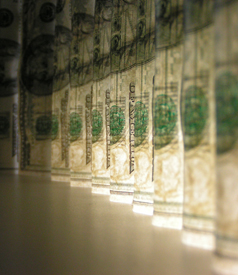Honest, paywall-free news is rare. Please support our boldly independent journalism with a donation of any size.
Anonymous millionaires just helped elect dozens of ultraconservative congressional candidates, by pumping millions of dollars into national Tea Party organizations. And guess what’s at the top of the legislative to-do list for those same Tea Party groups? Blocking campaign finance reform legislation.
As Stephanie Mencimer explains for Mother Jones, one of the nation’s largest Tea Party organizations, the Tea Party Patriots, is already coming out guns-a-blazing against any lame duck effort to crack down on secret corporate spending in elections.
And with good cause. The Tea Party’s appeal, after all, is based on its populist, grassroots image. If anybody knew that secret right-wing millionaires were bankrolling the entire operation, the “movement” would lose its luster.
But whether reformers are able to force front-groups to disclose their donors or not, the broader effort to eliminate undue corporate influence from the political process will take years.
Welcome to the Plutocracy
The Supreme Court’s decision in Citizens United v. Federal Elections Commission allowed corporations and deep-pocketed elites to spend unlimited amounts electing politicians of their choosing. So long as those expenditures are funneled through a front-group, nobody has to know who is buying an ugly attack ad or why. Instead ads are sponsored by groups with a innocuous-sounding names like “Americans for Prosperity” or “Americans for Job Security.” Nobody knows who ultimately foots the bill.
In organized crime, this process is called “money laundering.” And everyone is getting in on the game, from the Tea Party to Karl Rove to U.S. Chamber of Commerce. As Bill Moyers explains in this Boston University lecture carried by Truthout, it’s ravaging American democracy.
Rove, other conservative groups and the Chamber of Commerce have in fact created a “shadow party” … We have reached what … former Labor Secretary Robert Reich calls “the perfect storm that threatens American democracy: An unprecedented concentration of income and wealth at the top; a record amount of secret money flooding our democracy; and a public becoming increasingly angry and cynical about a government that’s raising its taxes, reducing its services, and unable to get it back to work. We’re losing our democracy to a different system. It’s called plutocracy.”
That, ultimately, is what is at stake with campaign finance reform. Can democracy continue to serve as a check on elite power? Or will America simply dance to the tune played by the super-rich. Citizens United made an undemocratic mess of this year’s election—but the influence of corporate cash is not going to simply melt away. Without serious reforms, the very concept of American elections will become a quaint, naive relic of the past.
Wall Street wins big
And while the plutocracy plainly organized itself against Democrats in this election, democrats have not exactly been strangers to corporate largesse. As Laura Flanders emphasizes for GRITtv, while President Barack Obama occasionally offered rhetorical rebukes against the Wall Street establishment, so far as public policy was concerned, he rarely did anything to ruffle their feathers. Obama continued the Bush bailouts, praised the executives of firms would eventually be investigated for fraud as “savvy,” and aimed pretty low on financial reform. But as Flanders notes, all those favors didn’t end up helping either Obama or his party on Nov. 2:
Having soaked up the government’s largesse, those banksters repaid Obama by pouring millions of anonymous dollars into defeating Democrats.
It worked. The most vocal Wall Street critics in the House and Senate—Rep. Alan Grayson (D-FL) and Sen. Russ Feingold (D-WI) were bombarded with attack ads courtesy of the U.S. Chamber of Commerce. Now they’re gone, along with the Democratic majority in the House.
Last-ditch effort on campaign finance reform
As Jesse Zwick emphasizes for The Washington Independent, Congress can still limit the damage in the coming months before the officials elected last night take office. A modest law that would require corporations to disclose their political expenditures and force front-groups to publicly identify their donors would help limit the damage.
After that, as Moyers emphasizes, it’s a long, hard fight.
But wait! There’s more.
- Andy Kroll at Mother Jones notes that Rick Scott didn’t really need money from outside groups to buy the Governor’s race in Florida. He did it himself.
- Jason Hancock reports for The Iowa Independent that outside groups spent more than $1 million to oust judges that ruled to legalize same-sex marriage in Iowa.
- John Nichols and Richard Kim of The Nation talk to GRITtv’s Laura Flanders and Democracy Now!’s Amy Goodman on the midterm results, and what to expect from corporate expenditures in 2012.
This post features links to the best independent, progressive reporting about the mid-term elections and campaign financing by members of The Media Consortium. It is free to reprint. Visit The Media Consortium for more articles on these issues, or follow us on Twitter. And for the best progressive reporting on critical economy, environment, health care and immigration issues, check out The Audit, The Mulch, The Pulse, and The Diaspora. This is a project of The Media Consortium, a network of leading independent media outlets.
Trump is silencing political dissent. We appeal for your support.
Progressive nonprofits are the latest target caught in Trump’s crosshairs. With the aim of eliminating political opposition, Trump and his sycophants are working to curb government funding, constrain private foundations, and even cut tax-exempt status from organizations he dislikes.
We’re concerned, because Truthout is not immune to such bad-faith attacks.
We can only resist Trump’s attacks by cultivating a strong base of support. The right-wing mediasphere is funded comfortably by billionaire owners and venture capitalist philanthropists. At Truthout, we have you.
Truthout has launched a fundraiser to raise $45,000 in the next 8 days. Please take a meaningful action in the fight against authoritarianism: make a one-time or monthly donation to Truthout. If you have the means, please dig deep.
